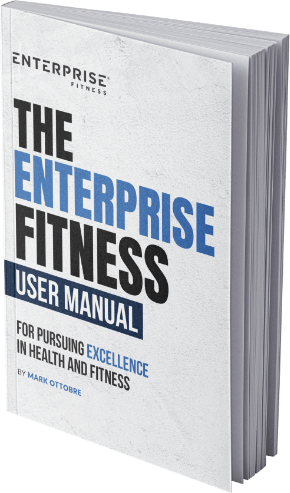This week Mark answers a question from Facebook fan Callum, who asks “why do training programs to improve your one rep max not involve mostly sets with 1 rep?”
Watch Mark’s video reply:
Make sure you check out all of Mark’s videos at the Enterprise Fitness YouTube channel. Leave a comment to let us know what you think.
If you would like to train with Mark or a member of his team, email [email protected] or call 1300 887 143.
I don’t know of any athlete in the world that trains to maximum capacity every single workout. If they did, it’s definitely a recipe to blow the nervous system out. But to discuss this point further, what we’re really looking at is comparing the way weightlifters train to the way bodybuilders train.
If you look at those two entirely different training cultures, obviously they have one thing in common, they both train. However, one is predominantly focused on developing the Central Nervous System (CNS), while the other is predominantly focused on developing the muscle and making it as big as possible.
For hypertrophy, it’s desirable to make the sets last longer. This aims to tear the muscle fibres as much as possible, and is then followed by adequate amounts of nutrition to help the muscle repair and make it grow. Essentially you’re getting stronger through increasing the actual size of the muscle.
When it comes to CNS training, which is most common for power lifters and strength athletes, what you’re actually doing is making the nervous system more efficient and more effective. Here’s an analogy that I like to give; everyone reading this article has the capacity within his or her muscular and skeletal system to lift a car, yet (for most) the Central Nervous System will not allow it. The CNS communicates with the muscular system and says, “You’re only going to recruit this much muscle at this given time”.
However, when we encounter a threatening or dangerous situation, our Central Nervous System can override our perceived strength or muscular capacity, allowing us strength and ability beyond what we originally thought possible. You might have heard stories of when a small child becomes trapped underneath a car and an everyday, ordinary man is able to override his muscular capacity, lift the car and rescue the child.
Now, with that said, when we do things like this, it does induce harm or injury to the body. It can tear ligaments, rip tendons and even break bones. Ultimately, it will cause damage to the body.
But why is this? And how are we able to achieve such strength, but only intermittently? It was Charlie Francis who said that the nervous system takes six times longer to recover than the muscles. So, while the bodybuilder is focused on hypertrophy, they can take that set to the absolute limit, without necessarily overtraining, but rather just fatigue the muscle. When we take a one rep max to the limit, and we keep pushing and pushing, it’s too much for our nervous system. Essentially we will ‘blow it out’. A consequence of this is a very sharp decline in performance.
To test this, go to the gym and train your one-rep max on a deadlift. The next day and the day after that, again train your one-rep max on a deadlift. Maybe on the second day, you will lift more. But on the third day, you’re definitely going to notice a plummet in your performance, because if it’s a true one-rep max it will be too taxing for the nervous system to recover from. The nervous system needs time.
The strength of your Central Nervous System is not going to be built in one day. From a biochemical point of view our muscles, cells and bones need time to develop. Our bodies recreate and redesign our muscles every 90 days, (I believe) our connective tissues every 200 days and bones, it takes up to two years.
In conclusion, in comparison to our Central Nervous System, the muscles in our body can deal with a lot more stress. Strength training, or training for your one rep max is really more around creating a neural connection to the muscle that you already have, whereas training for hypertrophy is about making the muscle bigger.
Mark Ottobre
Did you find this article helpful? Like it, share it and leave a comment to let us know what you think.





